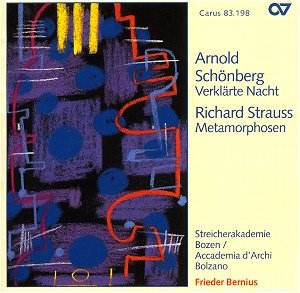It is said that really
good orchestras can conduct themselves,
and this is certainly true for the Streicherakademie
who usually play without a conductor.
Both Verklärte Nacht
and Metamorphosen are large-scale
chamber works – the former an orchestral
amplification of an original string
sextet and the latter a chamber work
for 23 solo strings. The execution on
this recording is immaculate except
for one regrettably flagrant intonation
mishap towards the end of the Metamorphosen
[22:19]. But all credit to the conductor,
Frieder Bernius, who is obviously a
tasteful musician. He resists the temptation
to wallow in self-indulgent late-Romantic
excess and instead treats us to a meaningful
sensuousness and constantly shifting
drama that is deeply moving.
Considering Verklärte
Nacht and Metamorphosen were
written so far apart, the similarity
between the two works is striking, and
there is little doubt that Schoenberg’s
early work is directly inspired by Strauss’s
mature composition. Both pieces resemble
each other particularly in structure,
style and gesture. They are highly chromatic
Romantic conceptions designed as single
movement symphonic poems – where Schoenberg
condenses five sections into one, Strauss
adheres to the thematically tri-partite
sonata-form structure. The inspiration
for each is drawn from extra-musical
sources and it is therefore important
to consider these for a proper understanding.
Richard Dehmel’s poem about a guilty
pregnant girl, consoled by her new lover
who insists that her unborn baby will
transform into their very own love-child,
lends its title and content to Verklärte
Nacht. The poetry’s translucent
quality is convincingly translated into
a musical tongue. The conceptual force
behind Strauss’s Metamorphosen
is the sadness of the last years of
WW2: an "inner", psychological
programme that bears no direct relation
to events – as does Schoenberg’s oeuvre
– but expresses a particular emotional
quality.
As I said earlier,
but for an unfortunately obvious moment
of poor intonation, this is a really
well polished recording. The Streicherakademie
deliver a true chamber music performance,
producing throughout a very intimate,
homogeneous sound. The effects are lush
but contained, and the instrumental
interplays are seamless. The acoustics
are, however, unforgiving – as though
one were sitting through a live concert,
every little detail can be heard: no
‘soft-focusing’ here. With a lesser
performance this would be a disaster,
but in my opinion, the vulnerable acoustic
actually works in its favour. The wispy
disturbances give a mark of authenticity.
My single subjective
criticism is that the Streicherakademie
fail to highlight the solo events within
the works. But this has to do with their
aesthetic approach – a consistent chamber
music democracy over a hierarchical
sound structure. Something in between
perhaps? I would have liked to hear
the solos sound out a little more, and
especially in Metamorphosen where
the violin, viola and cello are particularly
independent and tuneful. For those who
share my preference, let me recommend
the 1974 Karajan/Berlin Philharmonic
recording of Verklärte Nacht.
All in all, an exciting
recording. Not least for the powerful
climaxes and wonderful palette of dynamics
that are anchored in a rich and wholesome
chamber music sonority. The depth and
power of sound is impressive.
Aline Nassif
